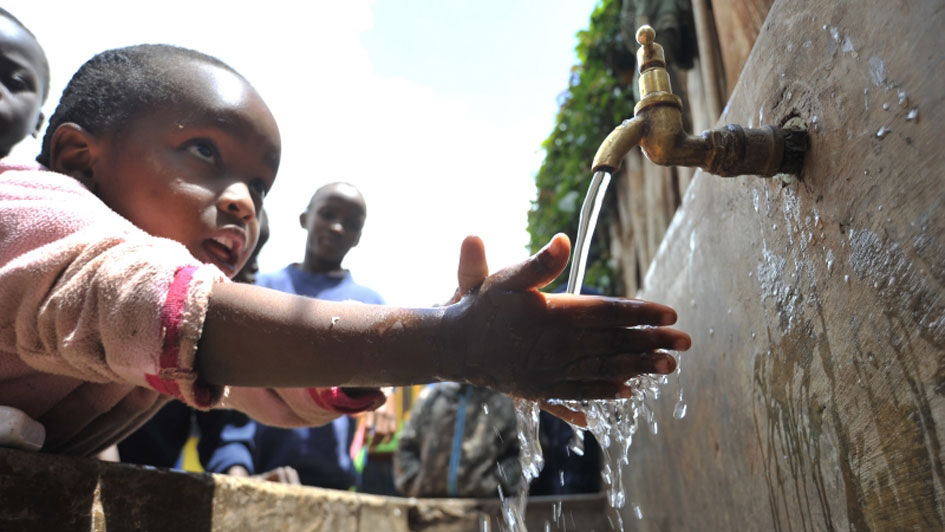Around the world today, 2.1 billion people lack access to a secure supply of drinking water, even though water is the foundation of our existence and an essential resource for sanitary facilities, health care, education, economic growth, and industry. In our operative project work, water plays an essential role in achieving sustainable economic, social, and ecologic development in line with the United Nations Agenda 2030. Every year on 22 March, World Water Day calls attention to these issues. This year’s focus is “water and climate change.”
Inextricably linked: Water and climate change
Water issues demonstrate the impact of global climate change: Access to water in many regions is becoming less predictable, while increased flooding threatens water supplies and sanitary facilities. Droughts exacerbate water scarcity, which limits people’s health and productivity. This year, the United Nations World Water Day focuses on the link between water and climate change. Combating the effects of climate change requires secure and sustainable water management that strengthens ecosystems and limits the risk of water-related catastrophes. Times of crisis, such as the current COVID-19 pandemic, highlight the importance of maintaining water supply and good hygiene practices.
Drinking water supply, Hygiene Promotion, and education: Our engagement in Africa and Latin America
Our foundation’s work focuses on the secure supply of clean drinking water, water recycling, and hygiene awareness. We rely on social entrepreneurial structures and technical innovations, but also education. The Potsdam Institute for Climate Impact Research says that education is a “tipping intervention” in the fight against climate change. In our project regions in rural Africa, climatic conditions have an outsized influence on daily life: Droughts and rainy seasons have a direct impact on the water supply, and extreme climate situations dramatically increase waterborne illnesses, livestock deaths, and crop failures. Water supply in Latin America is also closely tied to the effects of climate change. Structural deficits in water infrastructure and contamination of drinking water reservoirs compound these problems and lead to increased water conflicts.
Overview of our water projects
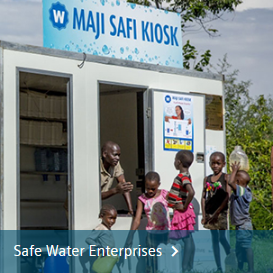 Safe Water Enterprises: Self-powered drinking water distribution for East Africa The Siemens Stiftung project “Safe Water Enterprises” works closely with local communities to operate drinking water kiosks in Kenya and Uganda and ensure a steady supply of clean drinking water. The kiosks utilize special filters to remove particles, bacteria, and viruses from water. In 2019, around 6.2 million liters of water were sold at nine locations. In the rural village of Wath Onger, a single kiosk that opened in March 2019 sold 2 million liters of water. In addition, the same village has seen no cases of cholera since last year. Alongside our educational work in schools and our efforts to supply them with facilities such as handwashing stations, close collaboration with local health workers on social marketing is an important part of this project.
Safe Water Enterprises: Self-powered drinking water distribution for East Africa The Siemens Stiftung project “Safe Water Enterprises” works closely with local communities to operate drinking water kiosks in Kenya and Uganda and ensure a steady supply of clean drinking water. The kiosks utilize special filters to remove particles, bacteria, and viruses from water. In 2019, around 6.2 million liters of water were sold at nine locations. In the rural village of Wath Onger, a single kiosk that opened in March 2019 sold 2 million liters of water. In addition, the same village has seen no cases of cholera since last year. Alongside our educational work in schools and our efforts to supply them with facilities such as handwashing stations, close collaboration with local health workers on social marketing is an important part of this project.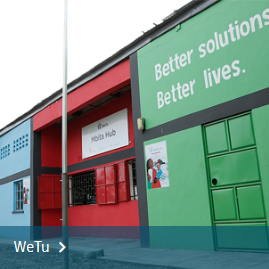 WeTu: Social business model with new technologies in Kenya
WeTu: Social business model with new technologies in KenyaInnovative filter technology is also being used at the foundation’s social enterprise, WeTu. A four-step treatment process purifies untreated water taken from Lake Victoria, creating a reliable supply of water for communities along the lake in Western Kenya. Vending machines in these communities provide clean, filtered drinking water that is available around the clock. Since the program was launched in April 2019, 800,000 liters of water have been sold.
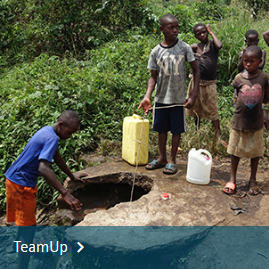 TeamUp: Focusing on water management in Uganda
TeamUp: Focusing on water management in UgandaThe program TeamUp is an initiative by the German Federal Ministry for Economic Cooperation and Development, Deutsche Stiftung Weltbevölkerung, Siemens Stiftung, and Hanns R. Neumann Stiftung that focuses on water management in Uganda. In that country, just one third of houses and only 40 percent of schools have access to a viable source of water. Siemens Stiftung supports the social enterprise Whave Solutions, which works with the public sector on permanently supplying rural regions with drinking water. The program also includes efforts toward improving plumbing and hygiene conditions in schools and developing better irrigation capabilities for small farmers.
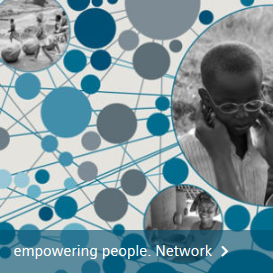 empowering people. Network: International database with 19 water solutions
empowering people. Network: International database with 19 water solutionsThe empowering people. Network supports several technical innovations in the Development Cooperation working area and is continually exploring new ways of counteracting future challenges. The network includes 19 water supply solutions, including irrigation pumps, water recycling processes, or treatment methods.
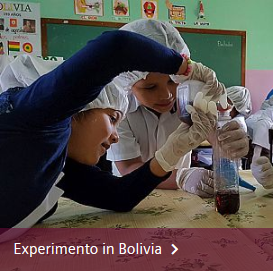 Experimento: Teaching materials on drinking water and wastewater in Bolivia
Experimento: Teaching materials on drinking water and wastewater in BoliviaThe local adaptation of our education program Experimento in Bolivia includes new teaching and learning materials on health and hygiene education. These reflect the increasing importance of drinking water and wastewater issues in the country. Challenges such as water pollution caused by untreated sewage, a high rate of waterborne disease, and water stress brought on by climate change are all part of the educational offerings.
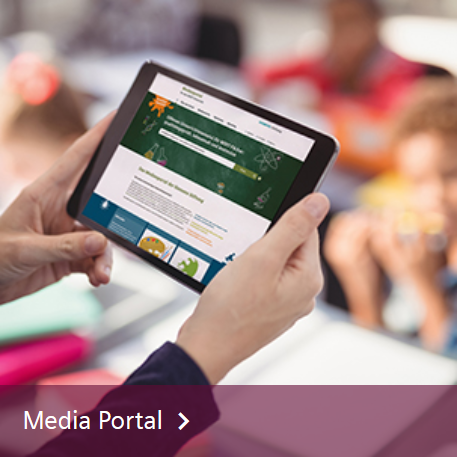 Media Portal: International online platform with teaching and learning materials about water and climate protection
Media Portal: International online platform with teaching and learning materials about water and climate protectionOur Media Portal provides several educational materials that address water issues. All materials are available under a public license as Open Educational Resources (OER). This means every user has full access to legal materials and the permission to modify or merge them with other materials, or to share them with others. A compilation of media on the subject water and climate protection is available here.
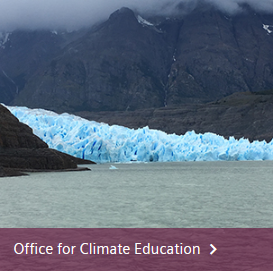 Office for Climate Education: Teaching materials on water and climate change
Office for Climate Education: Teaching materials on water and climate changeOur partner initiative, the Office for Climate Education, creates classroom lesson materials in four languages (English, German, French, and Spanish) about climate change that are free of charge and accessible around the world. The content and scientific foundation of the materials are based on reports from the IPCC (Intergovernmental Panel on Climate Change). One example is the OCE’s teacher handbook, “The climate in our hands – Ocean and Cryosphere,” based on the IPCC Special Report: “The Ocean and Cryosphere in a Changing Climate.” The handbook provides a scientifically-backed pedagogical treatment of the close link between water and climate change. The handbook and many other lesson materials on the subject of climate change are available here.
Overcoming challenges together
We are currently facing many challenges: extended droughts, sinking groundwater levels, and growing populations are just a few. The situation calls for continued development and expansion of water supply solutions in addition to efforts aimed at creating awareness about these issues. Solutions for dealing with brackish water or water that has been contaminated by chemicals will need to be improved and expanded. New technologies will need to be implemented, and education programs increased in scale. An interview with our water expert, Tilmann Straub, explains how technological innovations can help address some of the climate challenges related to water.
Video playlist
Experimento in Bolivia (Spanish)
Safe Water Enterprises in Kenya
Handwashing Song
TeamUp in Uganda



